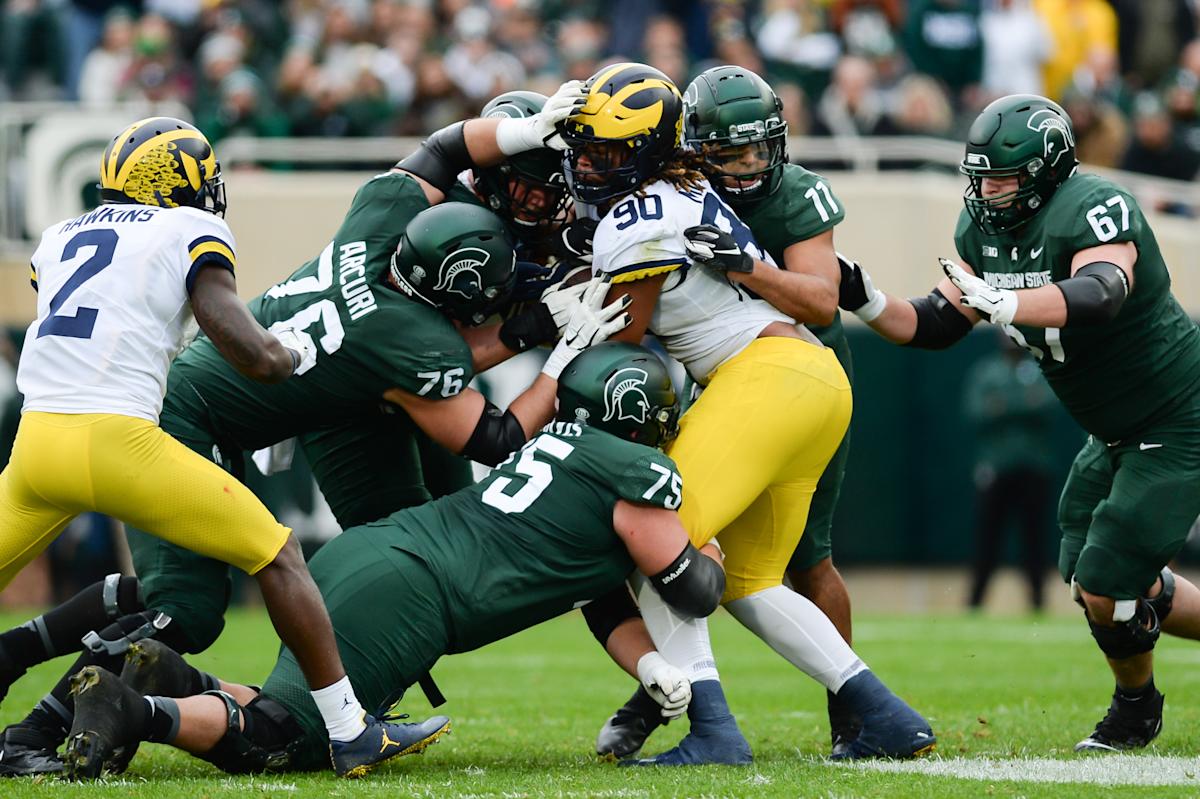The lead story in college football this week didn’t involve any star players, epic comebacks or even a look ahead to this weekend’s big matchups.
It centered on how the College Football Playoff committee decided to rank Michigan No. 6 and Michigan State No. 7 in this week’s standings even though they have identical 8-1 records and just nine days prior the Spartans had defeated the Wolverines.
“The committee gave great credence to the Michigan State win head-to-head against Michigan,” chair Gary Barta said.
Sure, except when it didn’t.
The order of the ranking between two teams outside the actual top four that would make the playoffs – if the season ended today, which it isn’t – is of no importance, of course. It’s a made-up exercise.
It caused a fan and media uproar anyway with days of negative stories, bad headlines, television rants, conspiracy theories, talk-radio rip jobs and social media uproar. Much of it centered on the perception that the playoff favors bigger brand programs in an effort to gin up television ratings.
It was another body blow to the credibility of the committee, the playoff and the entire sport.
And it was, as always, completely self-inflicted.
The issue isn’t that the selection committee might come up with some peculiar rankings backed by weak explanations – trying to rank 25 football teams with so few comparative data points is inherently problematic. Plus, there is an intellectual argument for UM over MSU. The issue is that the committee was attempting to do it in the middle of the season as part of a bizarro marketing plan that does little in creating excitement for the postseason but plenty in making fans believe the sport is corrupt, incompetent and stupid.
The truth is, it doesn’t matter where Michigan or Michigan State is ranked this week. Both teams have three regular season games remaining – including against Ohio State and Penn State. Things tend to sort themselves out.
As such, by Dec. 5, when the committee actually sets the playoff field, the debate will likely be moot.
In some seasons, there has been almost no controversy over the top four teams. The committee’s job on the final weekend is often very easy. The ranking that matters causes no negative reaction; the rankings that don’t, do.
So why do it? Why create a television show that serves to make the playoff only less popular and less trusted? The NFL doesn’t do anything like this and it continues to grow in popularity.
Just let the sport be the sport. Stop turning the late-season focus into who is or isn’t getting screwed in a pretend argument.
While College Sports Inc, will – as it often does – repeat some old conventional wisdom that angry debates are what drive interest, why is that accepted? It’s not like any other sport does this.
You don’t need a rankings show for fans and media to argue about who should, hypothetically, get into the playoff anyway. That will happen organically – both the Associated Press and USA Today, via a coaches vote, provide unofficial top 25.
Money? Sure, ESPN gets a weekly half-hour show, but the result is often a segment of fans blaming the network for secretly pulling strings. That has left ESPN, and its front-facing personalities, trying to defend themselves against nebulous credibility charges that aren’t even true.
Television ratings for the playoff have steadily declined across its seven-year existence. In 2014, the three playoff games averaged 30.4 million viewers. In 2018 it was 25.6. Last year it dropped below 20 million for the first time, checking in at 18.9 million, per SportsMedia Watch.
Matchups and the competitiveness of games play a role in year-to-year ups and down, and certainly last year’s COVID-truncated season didn’t help, but how many fans of the sport have given up on the playoff because they have been fed a steady diet of baffling rankings that make them distrustful?
No one needs scenes such as last week’s “ESPN GameDay” appearance at the University of Cincinnati, which should have been a celebration of the Bearcats program. Instead fans, angry over their current (and meaningless) ranking, overloaded the broadcast with insults and taunts at Barta, the otherwise reasonable athletic director at the University of Iowa.
A committee is needed in college football, where 130 teams are competing for a single championship. Someone has to select the at-large teams and set the seedings. A single, public computer formula could theoretically also do the trick, but that isn’t going to fly.
What isn’t needed is half-baked results, and tortured and contradictory reasoning each week that boxes the committee in on later decisions. Just come out with the final rankings. Just speak once a year. Avoid the weekly piñata routine.
College football is almost certainly going to get a new 12-team playoff soon. It’ll be more exciting, more equitable and more profitable.
But part of the new plan should include sending the weekly ratings show to the trash heap of horrible sports marketing ideas. This is just dumb.





